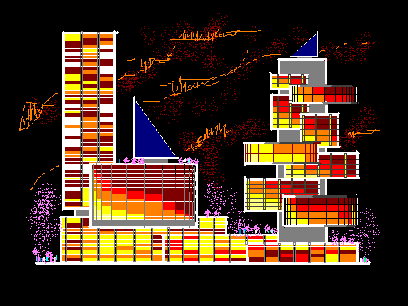|
Cities: Scale, Skyscrapers, Traffic, and A Likeable Character
Stephen Chung Executive Director
Zeppelin Real Estate Analysis Limited
May 2003
To many, a city is a place where there are lots of people, tall buildings dominating the skyline, and traffic congestions. In many instances, this is a reflective description, especially for densely populated regions or countries. Based on media reports from China, it seems many cities aspire to become huge metropolitans, preferably in the global league if possible, and focus only on projects of a grand scale. Nonetheless, your humble author doubts if this is the only way to have a city or is even beneficial or sustainable all the time. A few observations as follows: A) Scale: Not every city (in the world) can become a (global or otherwise) huge metropolitan = it is impossible and it is also unnecessary whether from an economics, world trade, global investment, resource distribution, population, socio-governmental, and the like, angle. In fact, it is better for different cities to pursue different but individually beneficial development route that enhances one’s market niche and competitive edge. In the process, some will become major metropolitans while others will be smaller yet vital regional or area centers, and unintentionally, a network of urban centers will emerge. Using the USA as example, metros with more than 10M people are just a few, even ones with over 5M people are not many. For investors, it may be preferable to invest in the best 2nd tier cities than in metros at the end of the 1st tier list. In short, a city’s success is not judged or decided by its scale. B) Skyscrapers: Cities do not necessarily need (many) skyscrapers = your humble author likes skyscrapers yet this is beside the point, which is there is no need to have the world’s tallest buildings simply for sake of having them. There must be sufficient economic capacities for such buildings else white elephants they will be, and most ‘ tallest this or biggest that ’ consume huge amounts of resources, public or private, which make them relatively risky projects, either due to insufficient demand or bad timing etc. In short, a city’s success does not depend on having world-record-breaking but economically unjustifiable monuments. C) Traffic: Cannot be solved via building more roads = instinctively, building more roads sounds like a viable solution yet if one thinks harder, it may not be useful all the time. For instance, the traffic problem in Central is unlikely to be solved by building more roads in the New Territories of Hong Kong. People congregate in a place because they need / want to be there, either for business, meeting friends, having fun etc. They do not go there because of the roads. In short, building more roads may only help the urban development of New Territories, while solving Central’s traffic congestion implies having traffic diversions or alternative transport modes. D) Character: Defines a city = this is particularly important for aspiring world or tourist cities, and it is dependent on the (human) software that matters more (than the physical hardware, which is easier to emulate). The software encompasses the overall character-culture of the populace and is reflected in everyday aspects such as business customs, food preferences, arts and cultures, public hygiene, folk mannerism, societal courtesy, and the like. Collectively, this character needs to be in the broadest sense of the word ‘ likable ‘ and naturally evolved (not planned and designed). How vital it is? Imagine these, a Paris without the French or French street cafes, a Tokyo without the Japanese or sushi, or a Shanghai without the Bund or Shanghai dialect. They will all lose some of their luster. To sum it up, some cities need to compete on being the biggest metros and to have large grand scale projects, but many can do better with much simpler fanfare. Regardless, they all need to have a likeable character. Notes: The article and/or content contained herein are for general reference only and are not meant to substitute for proper professional advice and/or due diligence. The author(s) and Zeppelin, including its staff, associates, consultants, executives and the like do not accept any responsibility or liability for losses, damages, claims and the like arising out of the use or reference to the content contained herein. |
Phone (852) 37576388 Fax (852) 37576399 E-mail contact@real-estate-tech.com
Address c/o Zeppelin, Unit 1007, 10/F, CCT Telecom Building, 11 Wo Shing Street, Shatin, NT, Hong Kong
Copyright rests with Zeppelin and/or relevant authors
